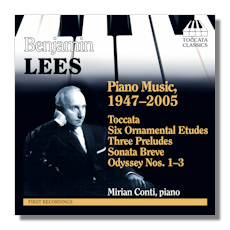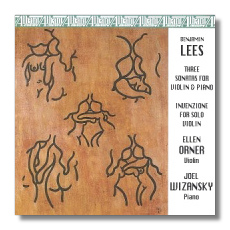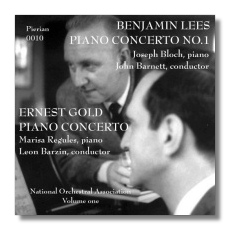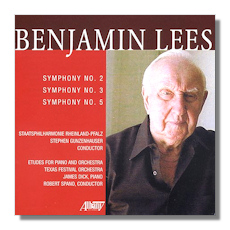
The Internet's Premier Classical Music Source
Related Links
-
Find CDs & Downloads
Amazon - UK - Germany - Canada - France - Japan
ArkivMusic - CD Universe
Find DVDs & Blu-ray
Amazon - UK - Germany - Canada - France - Japan
ArkivMusic-Video Universe
Find Scores & Sheet Music
Sheet Music Plus -
Search Amazon
Recommended Links
Site News
Benjamin Lees
(1924 - 2010)
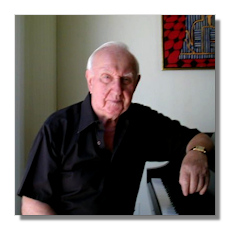
The most salient features of the music of Benjamin Lees (January 8, 1924 - May 31, 2010) are its coherence, its drama, its driving rhythms, and its independence of mind. When American composers tried to become the Next Copland, the Next Stravinsky, or the Next Webern, Lees kept to a classical base without really becoming neoclassical. He studied at USC in Los Angeles with Halsey Stevens and Ingolf Dahl, among others, but by far his most influential tuition came from the maverick George Antheil, who discerned real talent in him. He also told him his orchestration as weak and they worked mainly on that as well as smoothing out formal awkwardness. However, except for diagnosis, Antheil left Lees pretty much on his own. As Lees once remarked, "Never did he actually put his pencil to my manuscript. Never." For four years, Antheil essentially criticized in detail and for free the scores Lees brought him. Lees recognized Antheil's kindness for the rest of his life.
Lees began with Serge Prokofieff and Béla Bartók as models but quickly moved his own way, a very personal neoclassicism – that is, music that emphasized clarity of thought and texture. From 1954 to 1962, Lees lived in France, supported at least partially by a Guggenheim fellowship and a Fulbright grant. One result of the move was that Lees largely stayed out of the critical fights in the United States and went about writing his own kind of music. He paid, I believe, a price for his independence and for his belief that a work should speak for itself. Major venues, including those cities where he had spent significant amounts of time, mainly ignored him. His music became an afterthought, a matter of, "Oh, yes, and Lees." He lacked especially the New York connection and the advocacy of Leonard Bernstein. Still, he got commissions from major performers. Gary Graffman premiered his Piano Concerto #2. Ruggiero Ricci got his violin concerto. The concerto for string quartet, probably his most played piece, received performances from George Szell and Leonard Slatkin. But the star-level classical-music world is, like academia, a very conservative place. Lees's brother tells of a Stanford academic during the Seventies who tried to get Lees appointed as university composer-in-residence. The academic dean looked over Lees's résumé and the long list of grants, prizes, and performances and turned him down. No Ph.D. By that criterion, he wouldn't have hired Igor Stravinsky, or Beethoven for that matter.
In France, Lees became friendly with French artists, many of them surrealists like Man Ray (all right, not strictly speaking French), and critics began to apply to his work the term "surrealistic," a problematic designation. Most of Lees's music if anything shows a very steely logic, the very opposite of surrealism, and a fondness for the "hard" contrapuntal procedures, like canon and fugue. During the Sixties, he taught at several prestigious American musical institutions including Peabody Institute and Juilliard as he continued to compose. He wrote up to a few months before his death.
Lees concentrated on instrumental forms. Although he has theater works, they don't take up much room in his catalogue. He excelled in symphony, chamber music, and especially the concerto, which suited his dramatic temperament and mastery of contrast. He wrote concerti for piano (three of them), violin (one of the finest of the period), horn, oboe, as well as a piano concertino called Declarations, sectional concerti – for string quartet (perhaps his most-performed work), woodwind quintet, and brass – and a concerto for orchestra. There are also concerted works for chamber orchestra and a double concerto for cello and piano. Among his distinguished piano pieces one can count the three Odysseys, which for once merit the label "surreal," moving from one thing to another by association, rather than through classical structures.
Lees wrote wonderfully throughout his career, always concerned with saying things his own way, never satisfied with tried-and-true. My favorite phase of his career comes from his old age, although I'm a fan of practically everything. However, the late works access deeper strata with extreme concentration of means. After years of mainly "absolute" music, he began to express some of his Jewish heritage without indulging in Blochian Romanticism. Symphony #4 "Memorial Candles" (1985) is one of the few pieces of music to treat the Holocaust without diminishing it in an excess of sentimental inflation or a dearth of substance.
Lees for a long time flew under the radar of the greater listening public, but he always had the respect of musicians, both for his music (prestigious organizations and virtuosi commissioned him) and for his devotion to his art. I hope for a breakthrough to general recognition for his work. ~ Steve Schwartz
Recommended Recordings
Piano Music
- Toccata, Ornamental Etudes, Preludes, Sonata Breve, Odyssey/Toccata Classics 69
-
Mirian Conti (piano)
Chamber Music
- Violin Sonatas #1-3, Invenzione for Solo Violin/Albany TROY138
-
Ellen Orner (violin), Joel Wizansky (piano)
- String Quartets #1, 5 & 6/Naxos American Classics 8.559628
-
Cypres String Quartet
 Orchestral Music
Orchestral Music
- Piano Concerto #1 w/ Gold/Pierian Recording Society 0010
-
Joseph Bloch (piano), John Barnett/National Orchestral Association
- Piano Concerto #2 w/ Creston, Bishop, Shawn/Albany TROY441
-
Ian Hobson (piano), David Alan Miller/Albany Symphony Orchestra
- Violin Concerto w/ Bloch/Artek AR-0042-2
-
Elmar Oliveira (violin), John McLaughlin Williams/National Symphony Orchestra of Ukraine
- Symphonies #2, 3 & 5; Etudes for Piano & Orchestra/Albany Records 564/65
-
Stephen Gunzenhauser/Rheinland-Pfalz State Philharmonic Orchestra
- Symphony #4 "Memorial Candles"/Naxos American Classics 8.559002
-
James Oliver Buswell (violin), Kimball Wheeler (mezzo soprano), Theodore Kuchar/Ukrainian National Symphony Orchestra














